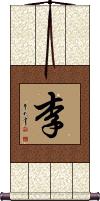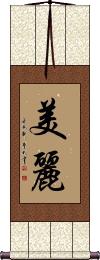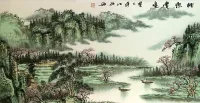The Name Li in Japanese/Chinese on a Custom-Made Wall Scroll.
Click the "Customize" button next to your name below to start your personalized li calligraphy artwork...
1. Li
2. Da Ji Da Li
3. Five Families / Tsoi Li Hoi Fut Hung
4. Jin Ji Du Li
6. Choy Li Fut
7. Beautiful
Da Ji Da Li
Five Families / Tsoi Li Hoi Fut Hung
蔡李何佛雄 is the five families associated with San Soo Kung Fu.
The characters are always the same, but there are several ways these are romanized from Cantonese, Mandarin, and other dialects. Some common ones include Tsoi Li Hoi Fut Hung and Choi Li Ho Fut Hung.
If you are using a different romanization, that does not mean it's wrong. It might just be that your school is using a different dialect or romanization scheme.
Jin Ji Du Li
金雞獨立 or “Jin Ji Du Li,” means “golden rooster stands on one leg.”
This is also called “crane stance” in English. This is used in wushu, karate, and other forms of martial arts.
This can be pronounced, “kinkei dokuritsu” in Japanese but it's rarely a title used in Japanese.
Lianne / Li-Anne
Choy Li Fut
蔡李彿 is Choy Li Fut, a Chinese martial arts that combines Northern and Southern Kung Fu styles.
Choy Li Fut is also known as Choy Lay Fut, Choy Lee Fut, Tsai Li Fo and Cai Li Fo, Choy Li Fut, Choi Lei Fut, Choy Lai Fut, Choy Ley Fut, Choi Lei Faht, Choi Leih Faht. These all come from the same 蔡李彿 characters, but different dialects have different pronunciations and romanization schemes for Chinese vary.
Some will write the third character 佛, others will write 彿 (note subtle extra stoke on left side). If you have a preference, place make a note when you place your order.
Beautiful
美麗 is a two-character word used often in Chinese, old Korean, and ancient Japanese to express beauty.
I've had a few requests for a “two-character beautiful,” and this is by far the best word. This is not a common word for an Asian person to want on a wall scroll. However, you will see it commonly used as an adjective in phrases, stories, and titles throughout magazines and signage in China.
美麗 can also be translated as gorgeous or lovely.
Note: 美麗 is not commonly used in modern Japan.
This in-stock artwork might be what you are looking for, and ships right away...
Gallery Price: $400.00
Your Price: $248.88
Gallery Price: $200.00
Your Price: $79.88
Gallery Price: $400.00
Your Price: $138.88
The following table may be helpful for those studying Chinese or Japanese...
| Title | Characters | Romaji (Romanized Japanese) | Various forms of Romanized Chinese | |
| Li | 李 | lǐ / li3 / li | ||
| Li | リー | rii / ri | ||
| Da Ji Da Li | 大吉大利 | dà jí dà lì da4 ji2 da4 li4 da ji da li dajidali | ta chi ta li tachitali |
|
| Five Families Tsoi Li Hoi Fut Hung | 蔡李何佛雄 | cài lǐ hé fú xióng cai4 li3 he2 fu2 xiong2 cai li he fu xiong cailihefuxiong | ts`ai li ho fu hsiung tsailihofuhsiung tsai li ho fu hsiung |
|
| Jin Ji Du Li | 金雞獨立 金鸡独立 | kin kei doku ritsu kinkeidokuritsu | jīn jī dú lì jin1 ji1 du2 li4 jin ji du li jinjiduli | chin chi tu li chinchituli |
| Lianne Li-Anne | リーアン | rii an / riian / ri an | ||
| Choy Li Fut | 蔡李彿 蔡李佛 | cài lǐ fó cai4 li3 fo2 cai li fo cailifo | ts`ai li fo tsailifo tsai li fo |
|
| Beautiful | 美麗 美丽 | birei | měi lí / mei3 li2 / mei li / meili | |
| In some entries above you will see that characters have different versions above and below a line. In these cases, the characters above the line are Traditional Chinese, while the ones below are Simplified Chinese. | ||||


















